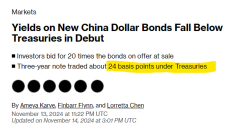You are using an out of date browser. It may not display this or other websites correctly.
You should upgrade or use an alternative browser.
You should upgrade or use an alternative browser.
Miscellaneous News
- Thread starter bd popeye
- Start date
Supa-hypa missile for supa-hypa powa, please.It’s a super-hype missile, close enough.
I've noticed the west are moving back on woke issues. At least for the time being.
That's why I personally never gave a crap about all these things like trans stuff. They're just artificially pushed fads that could easily fall out of favour once the ruling party decides so. The fact so many westerners cut their balls off just because it was the cool thing to do shows they are NPCs no better than everyone else.
Thats why I think as more time passes, the more I think a lot of stuff China did that was criticized will be seen as forward thinking in the future. They weren't stupid to fall for the fads like democracy or trans rights. You don't do thinks because it's cool. You do things because you believe it is the most logical approach to take.
That's why I personally never gave a crap about all these things like trans stuff. They're just artificially pushed fads that could easily fall out of favour once the ruling party decides so. The fact so many westerners cut their balls off just because it was the cool thing to do shows they are NPCs no better than everyone else.
Thats why I think as more time passes, the more I think a lot of stuff China did that was criticized will be seen as forward thinking in the future. They weren't stupid to fall for the fads like democracy or trans rights. You don't do thinks because it's cool. You do things because you believe it is the most logical approach to take.
America's gift to Peru to counter CHYNA that the western press is making a big deal over was just selling some ancient decommission diesel caltrain trains

Even amid that strength, China stands out. The yield on its dollar note due November 2027 has been below that for Treasuries for most of the past year. It was last about 18 basis points under the equivalent US government bond, Bloomberg-compiled data show.
In a sense, it’s surprising that such gauges for the cost of borrowing for China would be at or below that of the US. China has lower credit ratings from the major international assessors than the US. For example, Moody’s Ratings gives it an A1 rating, its fifth highest investment-grade score, compared with Aaa for the US.
So my understanding is:
1. There are countries that hold a lot of USD that would like to spend all that USD to buy things like infrastructure development, but is unable to because US doesn't export that. Saudi Arabia in this case is like that because of their oil trade.
2. China is seen as more reliable than even the US itself, so people buy up Dollar Bond from China in preference to US treasuries, hence why China's Dollar Bond has a lower yield (people willing to accept lower return, because they feel China is more likely to pay back at maturity compared to US itself).
3. China uses the dollars raised this way, plus that trillion dollar trade surplus and lend USD to countries having trouble getting enough USD to pay back loans to the US, instead of them going to IMF and asking for bail out. Meaning even during the previous high interest period US could not harvest anyone because no one was going "bankrupt" at a national level.
4. To pay back China for the USD loan, countries instead send their resources to China directly, denominated in USD but without any USD actually changing hand. Aside from USD loan countries may also borrow "USD" from China to finance infrastructure development, something that China very much exports.
End result:
1. Rich countries has somewhere reliable they can deposit their excess USD, instead of buying treasuries from US
2. Poor countries can payback USD loan even during times of high USD interest and low liquidity, they can further borrow against their resource export from China for infrastructure development
3. China uses up some of the USD surplus to buy needed resources, don't need to buy more US treasuries since USD is no longer piling up
4. America gets ALL the dollars from countries not defaulting and paying back loan on time with USD from China
Recent developments indicate that China has issued U.S. dollar-denominated bonds with yields lower than comparable U.S. Treasuries, reflecting strong investor confidence in China's creditworthiness.View attachment 139549
So my understanding is:
1. There are countries that hold a lot of USD that would like to spend all that USD to buy things like infrastructure development, but is unable to because US doesn't export that. Saudi Arabia in this case is like that because of their oil trade.
2. China is seen as more reliable than even the US itself, so people buy up Dollar Bond from China in preference to US treasuries, hence why China's Dollar Bond has a lower yield (people willing to accept lower return, because they feel China is more likely to pay back at maturity compared to US itself).
3. China uses the dollars raised this way, plus that trillion dollar trade surplus and lend USD to countries having trouble getting enough USD to pay back loans to the US, instead of them going to IMF and asking for bail out. Meaning even during the previous high interest period US could not harvest anyone because no one was going "bankrupt" at a national level.
4. To pay back China for the USD loan, countries instead send their resources to China directly, denominated in USD but without any USD actually changing hand. Aside from USD loan countries may also borrow "USD" from China to finance infrastructure development, something that China very much exports.
End result:
1. Rich countries has somewhere reliable they can deposit their excess USD, instead of buying treasuries from US
2. Poor countries can payback USD loan even during times of high USD interest and low liquidity, they can further borrow against their resource export from China for infrastructure development
3. China uses up some of the USD surplus to buy needed resources, don't need to buy more US treasuries since USD is no longer piling up
4. America gets ALL the dollars from countries not defaulting and paying back loan on time with USD from China
China's Strategic Financial Maneuvering: A Shift in Global Economic Dynamics
China's recent issuance of U.S. dollar-denominated bonds at yields lower than U.S. Treasuries marks a significant shift in global financial dynamics. This development suggests a strategic move by China to position itself as a central figure in international finance, potentially reducing the traditional dominance of U.S.-centric financial systems.
High Global Demand for China's Dollar Bonds
The overwhelming investor interest in China's dollar bonds indicates a growing confidence in China's economic stability and creditworthiness. Countries with substantial U.S. dollar reserves, such as Saudi Arabia, are opting to invest in these bonds over U.S. Treasuries, seeking diversification and potentially higher returns.
China as a Global Lender
By issuing these bonds, China accumulates U.S. dollars, which it can then lend to other nations, offering an alternative to traditional U.S. or IMF loans. This strategy not only provides China with a means to utilize its dollar reserves but also enhances its influence in global economic affairs.
Resource-Based Repayment Structures
The lending model often involves repayment through the export of resources to China, creating a direct exchange of goods for financial support. This approach secures China's access to essential resources while fostering economic ties with borrowing nations.
Implications for Global Economic Power
This financial strategy allows China to leverage the ubiquity of the U.S. dollar to its advantage, potentially diminishing the U.S.'s role as the primary intermediary in global financial transactions. By establishing itself as a direct lender and investment destination, China is reshaping the traditional financial landscape, promoting a more multipolar economic order.
In summary, China's issuance of low-yield, dollar-denominated bonds is more than a financial maneuver; it represents a strategic effort to recalibrate global economic power structures, positioning China as a central player in international finance and reducing reliance on U.S.-dominated financial systems.
Let the rug pulling begin....Recent developments indicate that China has issued U.S. dollar-denominated bonds with yields lower than comparable U.S. Treasuries, reflecting strong investor confidence in China's creditworthiness.
China's Strategic Financial Maneuvering: A Shift in Global Economic Dynamics
China's recent issuance of U.S. dollar-denominated bonds at yields lower than U.S. Treasuries marks a significant shift in global financial dynamics. This development suggests a strategic move by China to position itself as a central figure in international finance, potentially reducing the traditional dominance of U.S.-centric financial systems.
High Global Demand for China's Dollar Bonds
The overwhelming investor interest in China's dollar bonds indicates a growing confidence in China's economic stability and creditworthiness. Countries with substantial U.S. dollar reserves, such as Saudi Arabia, are opting to invest in these bonds over U.S. Treasuries, seeking diversification and potentially higher returns.
China as a Global Lender
By issuing these bonds, China accumulates U.S. dollars, which it can then lend to other nations, offering an alternative to traditional U.S. or IMF loans. This strategy not only provides China with a means to utilize its dollar reserves but also enhances its influence in global economic affairs.
Resource-Based Repayment Structures
The lending model often involves repayment through the export of resources to China, creating a direct exchange of goods for financial support. This approach secures China's access to essential resources while fostering economic ties with borrowing nations.
Implications for Global Economic Power
This financial strategy allows China to leverage the ubiquity of the U.S. dollar to its advantage, potentially diminishing the U.S.'s role as the primary intermediary in global financial transactions. By establishing itself as a direct lender and investment destination, China is reshaping the traditional financial landscape, promoting a more multipolar economic order.
In summary, China's issuance of low-yield, dollar-denominated bonds is more than a financial maneuver; it represents a strategic effort to recalibrate global economic power structures, positioning China as a central player in international finance and reducing reliance on U.S.-dominated financial systems.

